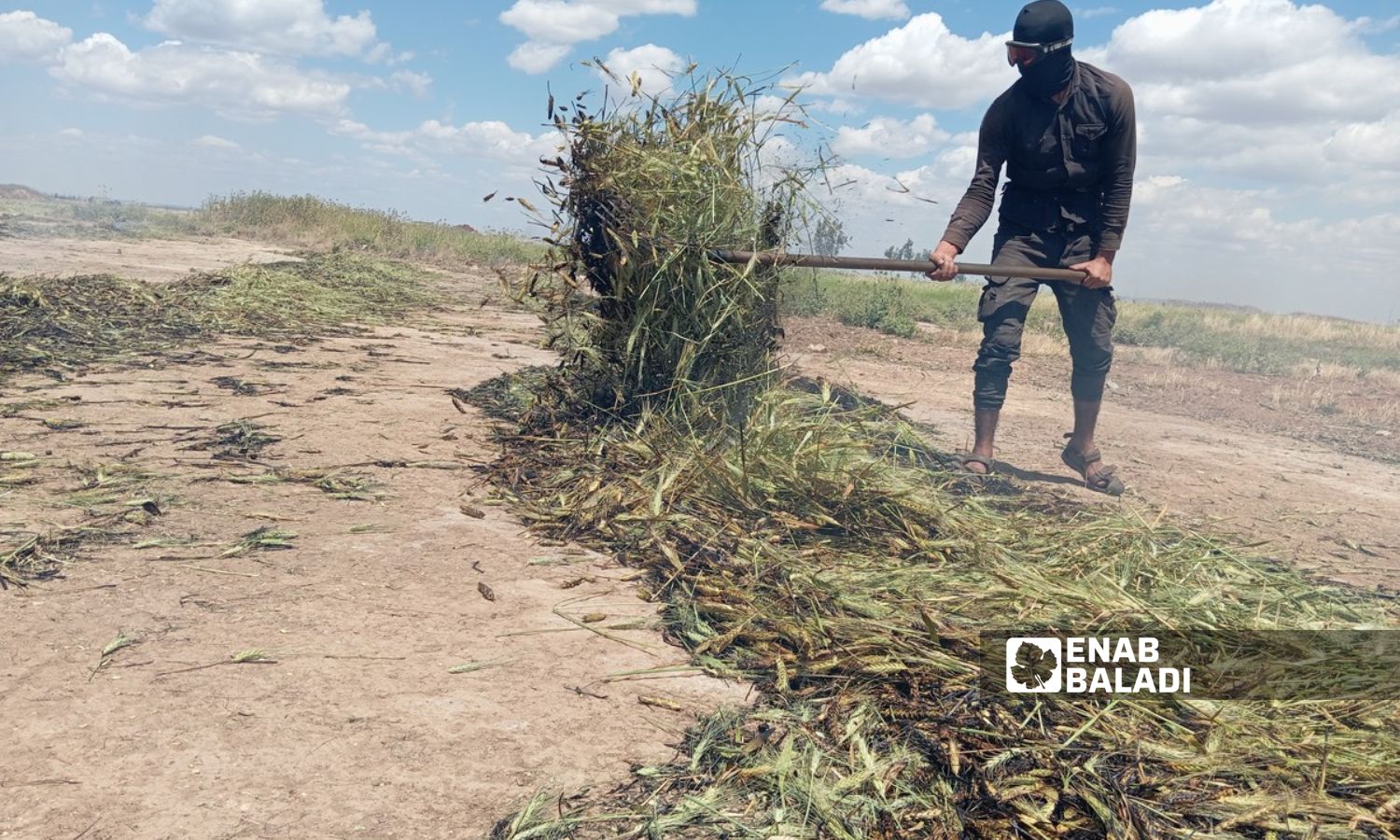



Enab Baladi – Idlib
Since the cessation of military operations, battles, and the opening of fronts in northwestern Syria following the Moscow Agreement or the Ceasefire Agreement on March 5, 2020, the geographical area in the region has shrunk, and opposition factions have lost vast territories.
Since then, a reservation system for roads in Idlib has emerged, with payments being made by farmers and merchants to burn freekeh (the process of burning wheat crops before they mature) after coordinating with local councils in each area, a practice previously uncommon.
This reservation process varies in its criteria, subjected to an auction, ending with the highest bidder. This results in additional costs for farmers, while some are forced to take risks to secure a few meters, competing against “wealthy investors” to avoid missing the season, according to farmers interviewed by Enab Baladi.
A farmer, who asked to remain anonymous fearing repercussions for his business next season, told Enab Baladi that reserving asphalt roads does not mean closing them entirely or even partially, but rather taking a longitudinal space that allows vehicles to pass. He noted that the reservation price varies by area.
The amount paid depends on the distance the farmer takes from the road. Farmers or merchants pay for a space wide enough to lay out wheat crops grown on an area ranging from 20 to 30 dunams, costing between $1,000 and $1,500.
Additionally, farmers or land lessees pay amounts for securing a place to burn freekeh on part of the road, referred to as “mafrash,” ranging from $200 to $500 for a space suitable for spreading a hectare of wheat. Farmers use this area until the freekeh season ends, which starts in the first week of May every year and lasts from 15 to 25 days.
The farmer mentioned to Enab Baladi that the auction for roads starts 20 days before the season begins, with major merchants or what he described as “whales of the market” securing the wide roads, such as parts of the Aleppo-Latakia international highway (M4) near the cities of Sarmin and Ariha in southern Idlib.
He explained that this cost was not anticipated four years ago, adding to labor costs, transportation, gas, sales commission, threshing (a process for separating grain from straw), fertilizers, and irrigation.
According to information obtained by Enab Baladi, renting roads is not present in all areas of Idlib where the Syrian Salvation Government (SSG) dominates. For instance, farmers cannot occupy parts of main or secondary roads or sidewalks, as local municipalities do not permit it.
There is no official decision from the Salvation Government imposing fees for road reservations, but local councils have issued these decisions based on the available data.
A clarification from the Central Region Administration (covering towns in eastern Idlib), in response to questions directed by Enab Baladi about the mechanism of determining rental prices for these spots and their variability from one location to another, explained that renting roads to farmers was introduced to “organize the occupation of these roads.”
According to the explanation, farmers are compelled to burn freekeh on paved roads to produce a good crop. This has led to conflicts between farmers and residents due to burning freekeh next to agricultural lands, risking fire spread due to the proximity to the flames.
The absence of reservations led to disputes among farmers themselves, each wanting the biggest and widest road, in addition to random burning or the use of vital roads, exposing farmers and civilians passing on the roads to traffic accident risks.
These reasons prompted municipalities to organize the matter, being primarily responsible for roads, their regulation, and maintenance. They identified suitable roads for burning and gathered farmers wishing to use these roads, implemented a nominal rent fee for usage, and organized a public auction among the farmers.
According to the Central Regional Administration explanation, the farmer increases the bid and takes the road based on its importance to him and his financial capability, with full consent without any compulsion, under contracts that guarantee the farmer’s rights and avoid causing harm to neighbors or the road itself. It is known that roads deteriorate after burning, reducing the lifespan of asphalt, leading to poor condition over the years.
The proceeds are used to repair these roads or fix poor roads in the same town where the roads were rented, according to the explanation.
The Salvation Government, composed of 11 ministries, controls life services and administration in Idlib province, northern Hama countryside, and part of western Aleppo countryside, while the Hayat Tahrir al-Sham (HTS) indirectly controls the region economically and service-wise. This control is accompanied by accusations of the HTS being behind many projects described as “monopolistic.”
if you think the article contain wrong information or you have additional details Send Correction